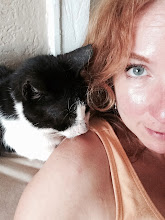In This Best of All Possible Worlds
Bernstein vs. Voltaire
Katie has put on one of her favorite DVDs, the production of Leonard Bernstein's Candide I got for my birthday a couple of years ago. So my stepfather and I are chatting on AIM and debating whether or not Bernstein adequately captured Voltaire's message. I say no.
Bernstein concludes, in what I think is one of his most beautiful and stirring passages:
We're neither pure, nor wise, nor good -
We'll do the best we know;
We'll build our house, and chop our wood,
And make our garden grow.
I don't have a copy of Candide in front of me, so I can't quote exactly what Voltaire concludes; but as I recall, Cunegonde ended up shrewish, ill-tempered, and ugly; Candide world-weary, resigned and joyless. Quite a bit darker than the passionate finale of the opera/musical, in my opinion anyway. My stepfather, on the other hand, feels that Voltaire's take was sunnier than I am interpreting it to be, and points out that Bernstein's treatment is distinctly sarcastic.
He is reminding me that Voltaire's Candide is still happy to end up with Cunegonde, even if she has become a half-assed old whore; and I am responding that in the musical, she's still cute, perky, blonde, pink, and friendly-like. Voltaire's Candide discovers that even when you eventually get your heart's desire, what you've gone through to attain it has ruined it.
Next we should cover the religious message of Leonard Bernstein's Mass. Oh my god. Do you know what I'd give to see that done live?
Nonono, I don't just want to see it. In the best of all possible worlds, I get to be in it.


0 Comments:
Post a Comment
<< Home